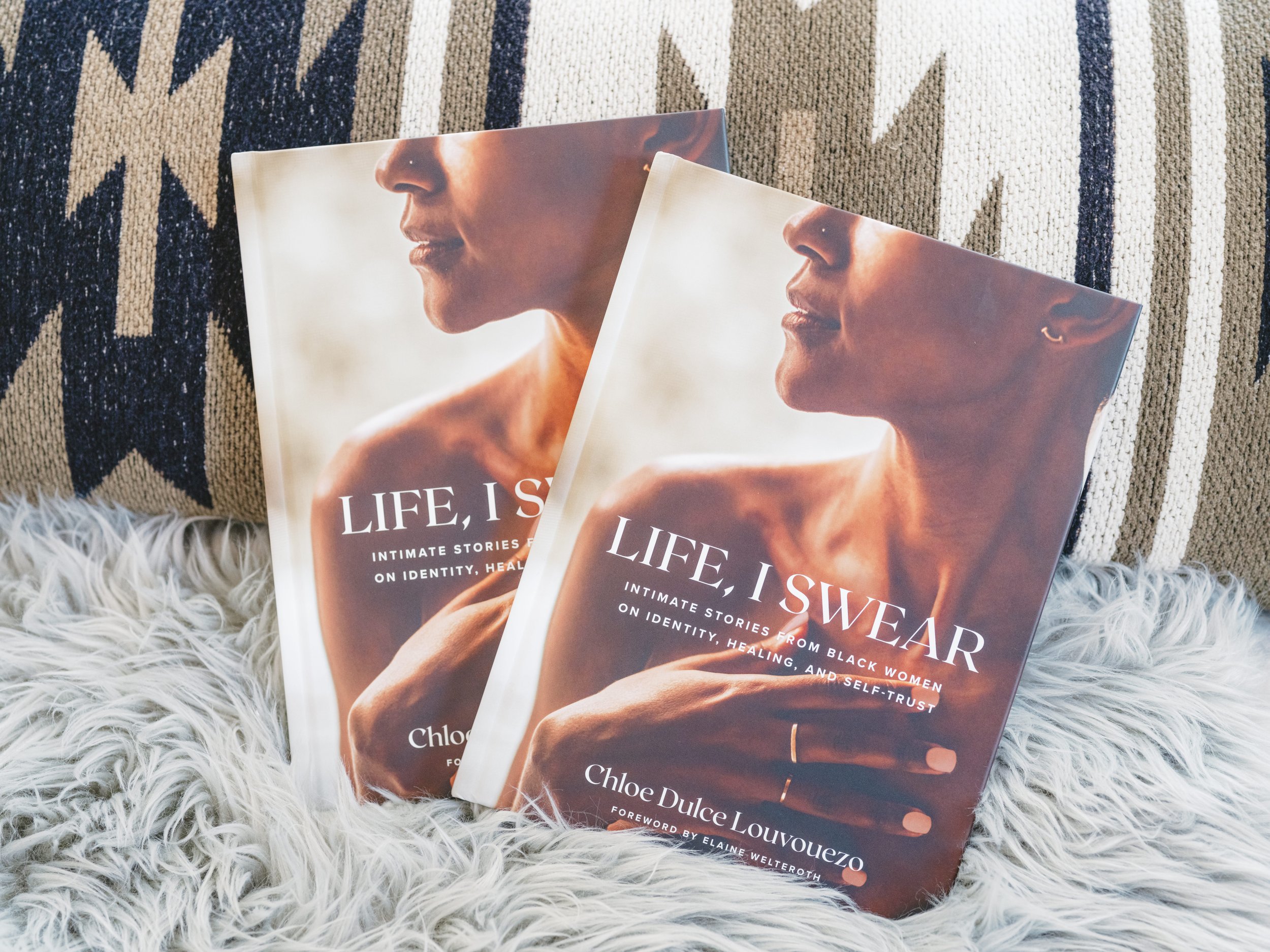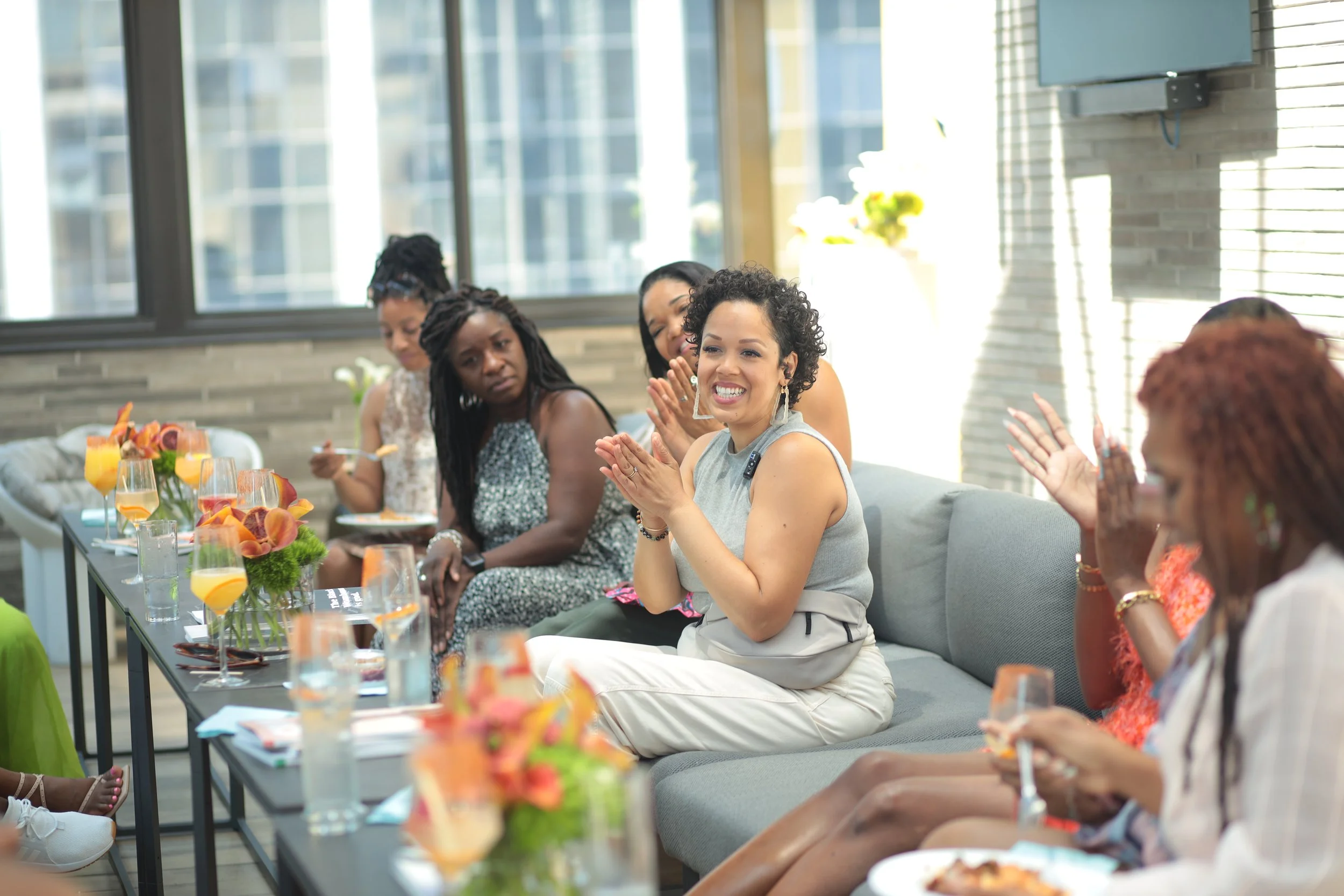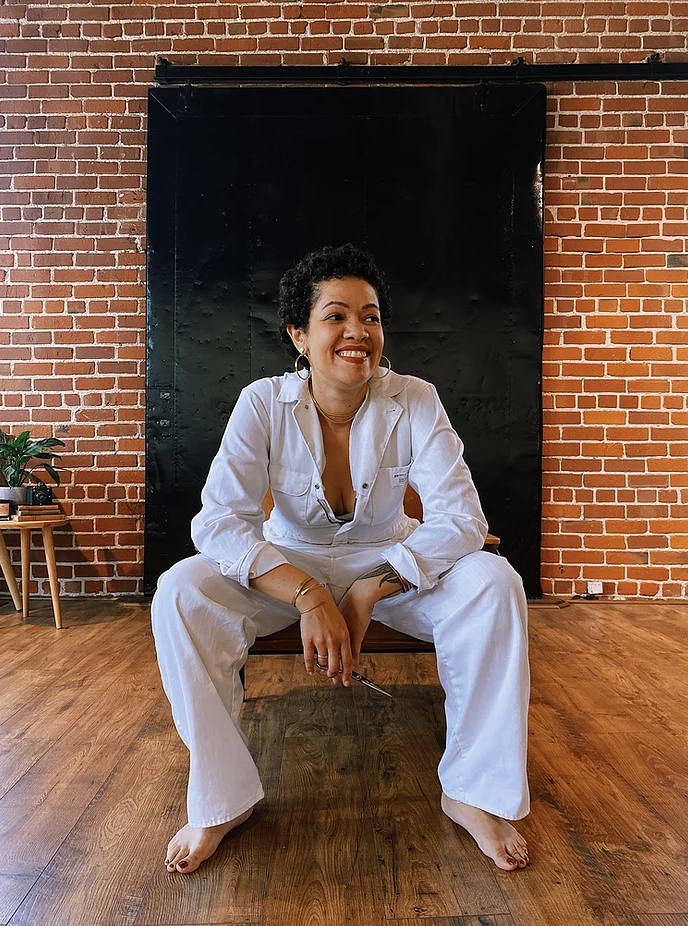Life, I Swear: A Conversation with Author Chloe Dulce
An Intimate Chat with the Author of Life, I Swear: Intimate stories from Black women on Identity, Healing and Self-Trust
Tell me a bit about yourself. Who are you/where are you from, what do you believe in, what is your mission?
I had a very nomadic and transient life growing up, which has kept me in a constant state of discovery even until now. I was born in Kinshasa, Democratic Republic of Congo; my father’s side is from Brazzaville, Republic of Congo and my mother’s side is white from Northern California. My mother and I moved around a lot, nearly every year to a different apartment, city or country. But the experience that shaped me the most was my years in Niamey, Niger. There, and since, I sat at the intersection of several microcosms and each operated within different racial, cultural, and economic realities. As a single mother, my mother followed the work and sometimes that took her to remote towns and villages so I lived with several families growing up. These families were diverse and complicated in their own ways and collectively raised me.
Because of my upbringing, I’ve always been fascinated with people’s stories; where they’re from, why they think the way they do, and what inspires or hinders us as a people to connect and express ourselves. As I’ve navigated this for myself, I recognize the necessity to feel truly seen and understood--that’s all we all want. I want to help make an indent in our collective understanding as a gateway to healing so that we can show up our full selves.
What was the spark that led to the creation of this book?
The spark was a decision to commit to my own personal healing through writing. At the time, less than two years ago, I was in deep need of a reset. I was in the midst of a really heavy time but also recognized that there were also parts of my past that I hadn’t yet addressed. Even in therapy I hadn’t been fully honest. Pushing myself through my pain through words was a necessary practice if I ever wanted to get to the other side of it. I always had a desire to write, document, and archive my stories and those of other women. The spark was a gut feeling that told me it was time. It started as a restorative exercise for myself but soon catapulted into a project and a vision that was much bigger than me.
What is the meaning of the title, “Life, I Swear”?
Have you ever had one of those conversations where you’re unpacking or questioning just how complex life is, where you end it with a sigh either of relief or exhaustion or excitement? That sigh is one I say often, coupled with “life, I swear…” It represents being present with our reflections in that moment about the expansiveness of life, recognizing all the stories that lie behind us and anticipating the life ahead of us. It’s that sweet spot between ambiguity and strong desires, but resting easy in the present for now.
The stories of some very powerful women lie in the pages of this book — how did you go about choosing whose stories would be told?
Some of the women I invited to be part of this book are women I’ve known for years, who have taught me so much about emotional alchemy as we’ve grown through womanhood and motherhood together. Others (like you!) have bodies of work that I’ve followed, who have been muses and teachers in their own ways. I wanted the contributors to reflect a multitude of backgrounds, geographies, and healing approaches so that collectively they could illustrate our diversity in ways that aren’t typically depicted. It was also important to me that the women’s stories overlapped around overarching themes that we all experience--identity, abuse, grief, heartbreak, resilience--but that each offered a different perspective that myself and readers alike would learn from. We’re all sitting on landmines of rich wisdom informed by our pain that is also a gateway to our peace and I wanted to pull from both ends of the spectrum for each woman. In the process, there was a huge responsibility for me to be delicate with their stories as I curated and pushed them into the world.
How are these stories a reflection of your life’s work? What is your life’s work?
I am constantly seeking to understand how our identities and our sense of selves are shaped and how that then informs our connections and what we assign value to, and vice versa. I’m really interested in learning the through line between all of those things. I believe they’re the fabric to building healthier relationships with ourselves.
I’ve always been a storyteller in some capacity. I studied journalism, and for the last 15 years have worked to advance inclusive storytelling at domestic and global organizations in the education and mental health sectors. In other seasons of life, I’ve been an avid photographer of women and girls in West and East Africa. And in my current podcast, also titled Life, I Swear, I have deep-dive dialogues with other Black women about how we process the trials of life. I would consider my life’s work to amplify voices of people who have been historically excluded from larger societal narratives, and doing so in a way that contrasts the fragility of life with the fighting spirit. That work is reflected in the pages of this book from the lens of Black women.
What was your intention in the publishing of these stories? What do you hope readers receive when they read this book?
I call this book (he)artwork. One of the contributors and friend Nneka Julia called it soul incarnate. This book feels very much like a full expression of who I am, and what and who I love. It’s a love offering to Black women. I wanted to create a safe space for Black women to feel seen, understood and valued, to offer validation and an invitation to Black women to tell their own stories. For those of us who have lived as shadow artists, whose voices have felt muffled or drowned out by society or the perceptions of others, I wanted to curate an opportunity for us to be the lead characters in our own stories. Too often, Black women are sidelined and their stories are told on their behalf. My hope is that those who pick up this book will be moved to revisit their own stories, self-examine their own pasts, and assign new language to their narratives that unlock their possibilities.
From idea, to words on a page, to the final product, the creation of a book is no small feat. Talk to me a bit about the process of its creation and how it feels to hold it in your hands? What did you learn going through that process?
It’s been a ride! The idea of this book was something I sat on for years. It was marinating for a while before I decided to take it off the stove, plate, and serve it. I was waiting to feel gutsy enough to take the leap. I knew it was time when it no longer felt like an option but a duty to myself to move my own stories forward. Challenging myself to work through my own truth telling on paper was a necessary progression of my healing work. Once I committed to curating other essays, the process from writing and collecting essays to the release date moved very fast. I submitted the proposal for this book to my publisher just a year and a half ago and now it’s manifested in physical form and it’s doing for other women what it did for me. It feels surreal; divine even.
To have created something that reflects our literary and visual beauty and diversity that we can hold and feel proud of together is a dream realized. I recognized though that many of us who contributed to this book were anxious about the sides of ourselves that we exposed naked to the reading eye. But through the practice of articulating our pasts and how they informed who we are now, it’s also been beautiful to learn how our stories are the portal through which we navigate life. The writing of these stories capture what we’ve learned about ourselves up to this point. What’s most comforting is that our healing journeys and how we can support each other as Black women is a well that will never dry.
Any advice to aspiring authors?
The writing process can be a very lonely one. You have to retreat inside yourself, revisit places you may have outgrown, or explore realms you desire to be. It’s a very internal experience that takes time to flesh through a clear direction. I’d encourage writers to remember that part of creativity and finding the right expression of our thoughts or ideas also involves living in the moment between our writing sessions. For me, getting in touch with the air, the sounds and the smells around me helps me return to blank pages with new details and senses to reference. Those senses allow me to lead with curiosity. How does what I’m writing about make me feel? What is that feeling telling me about myself? Translate that curiosity to a personal practice of self-examination, and you’ll find yourself writing from authenticity.
My hope is that those of us who are passionate about supporting Black stories, storytellers and authors collectively help each other advance through the publishing process. There’s varying data on representation in the publishing industry, depending on who is pulling it. But we do know that about 80% of people who work in publishing are white, and only 5% of published authors are Black. Black people also have low representation in literary agencies, on the editorial side, marketing and publicity side, sales and among book reviewers. While authors work on honing their talents and voices, more publishing contracts need to be made to authors who hold marginalized identities. It’s overdue that we change the makeup of the supply chain that holds the power to publish authors’ works.
Why was it important to essentially take something digital (your podcast) and turn it into something tangible?
What’s interesting is that the book was conceived before the podcast was born, though they were birthed into the world in opposite order. For most of the essay contributors, I collected their story specifically for the book. As we were having these soul-evoking conversations about their lives and those “life, I swear...” moments in general, I was inspired to also capture those and others in conversation through a podcast. Some of us, like myself, are able to better hold a mirror to ourselves when something revelatory is shared through dialogue. I also wanted to normalize more transparency and vulnerability among Black women and the podcast has been a creative effort to do that, by integrating these conversations into our continuous introspection. Like the book, the podcast dives into topics that are often under-discussed, including sexual trauma, troubled relationships with our mothers, sexual anthropology, grief, and abuse. Both are extensions of each other in that they gently provoke what may still be very tender while helping Black women feel more understood.
How can we get a copy?
I always ask that people support their local independent bookstore by purchasing from them first. And if they don’t carry the book, encourage them to! But it can also be found at most major retailers, including Amazon. This year, I'm also looking forward to building on the momentum of my book tour that started in November across the country through more intimate events in small communities. I keep my website and my Instagram updated on my whereabouts.





